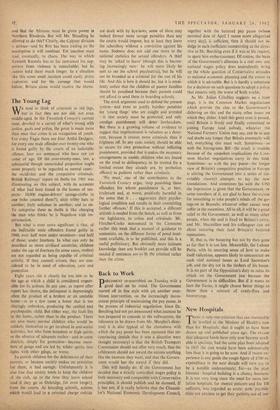Back to Work
D ARMAMENT re-assembled on Tuesday with a good deal on its mind. The Government started off in fine style with yet another over- blown intervention, on the increasingly incon- sistent principle of maintaining the pay pause, in the process of industrial negotiation. Since Dr. Beeching had not yet announced what increase he was prepared to concede to the railwaymen, the inference to be drawn from Mr. Marples's direc- tive) it is also typical of the clumsiness with which the pay pause has been operated that un- convincing denials that it was a directive were thought necessary) is that the British Transport Commission should not offer very much, that the arbitrators should not award the unions anything like the increase they want, and that the Govern- ment would bar the award if they did.
This Will hardly do. If the Government has decided that a strictly controlled wages policy is both necessary and compatible with Conservative principles, it should publish and be damned. If it has not, if it really believes that the Chancel- lor's National Economic Development Council, together with the battered pay pause (whose terminal date of April 1 seems more allegorical' every day), is sufficient, then it should not hi- dulge in such inefficient manoeuvring as the direc- tive to Dr. Beeching even if it was at his request, to spare him embarrassment. Of course, the basis of the Government's dilemma is a real one any national wages policy does undoubtedly bring up the whole question of Conservative attitudes to national economic planning and the extent to which it is advisable. But it is hardly a substitute for a decision on such questions to adopt a policy that ensures only the worst of both worlds.
As Mr. Julian Critchley suggests on a later page, it is the Common Market negotiations which provide the clue to the Government's dithering on this and the many other issues on which they dither. Until this great crux. is passed, until Britain is firmly and finally committed to joining Europe (and nobody, whatever the National Farmers' Union may say, can be in any real doubt any longer that Britain eventuall\. will be), everything else must wait. Sometimes as with the Immigrants Bill—the result is muddle because of the unspoken implications the Com- mon Market negotiations carry in this field.. Sometimes—as with the pay pause—the longer view of Britain's competitive position in Furope is stirring the Government into a series of (in- evitably clumsy) attempts to lay the new foundations. And sometimes (as with the UN) the impression is given that the Government, or some members of it, are glad to have the excuse for something to take people's minds off the go- ings-on in Brussels, whatever other causes may suffer in the meantime. All in all, it will be a great relief to the Government, as well as many other people, when the seal is fixed to Britain's entry, and Mr. Macmillan and his colleagues can set about restoring their (and Britain's) battered reputations.
If, that is, the battering has not by then gone so far that it is too late. Meanwhile, the Labour Party', with its unerring sense of how to make' itself ridiculous, appears likely to concentrate on such vital national issues as Lord SnoWdon's• job, and the dry rot in the timbers of his house.. It is no part of the Opposition's duty to relax its attack on the Government just because the Government is in difficulties. But if it wants to hurt the Tories, it might choose better things to throw than a mixture of candy-floss and' boomerangs.






































 Previous page
Previous page